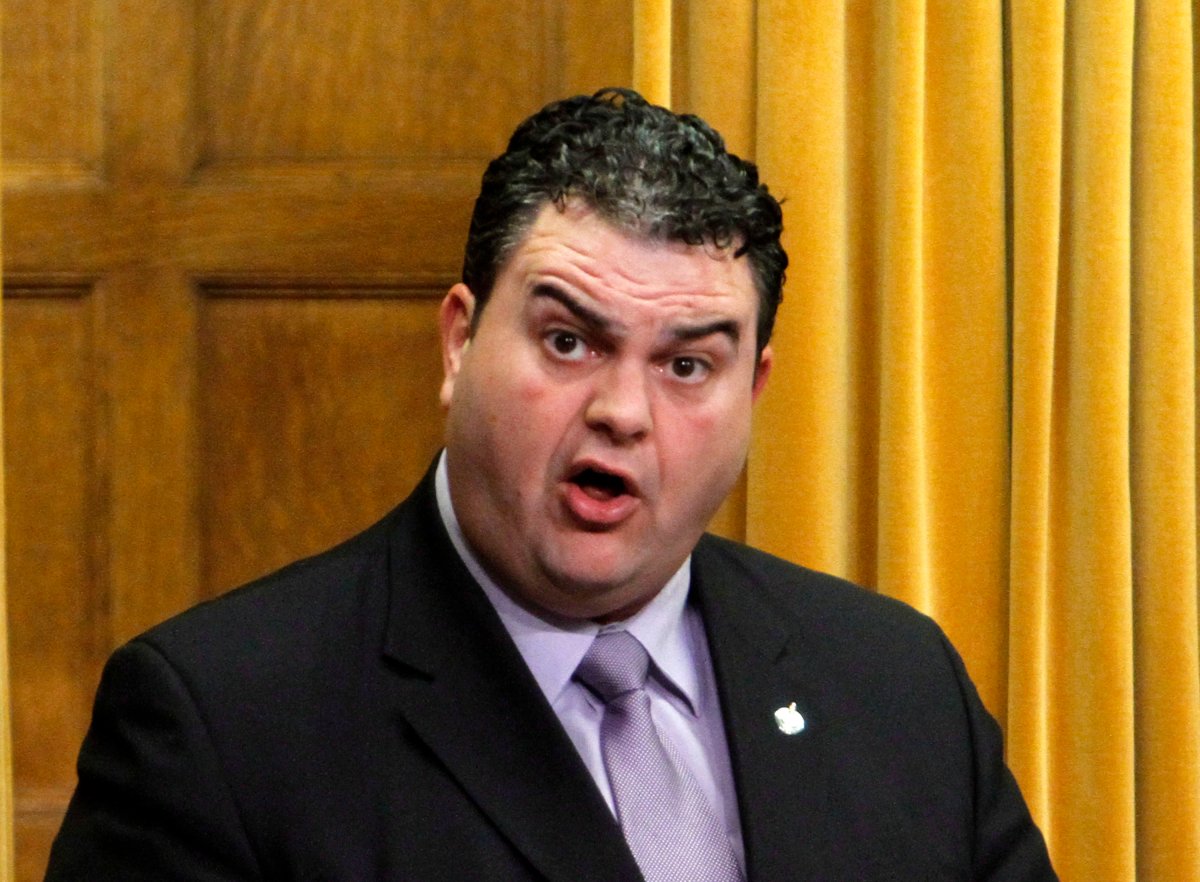PETERBOROUGH, Ont. – Ontario MP Dean Del Mastro urgently wanted voter ID and get-out-the-vote services for his 2008 campaign once he realized he wouldn’t be getting similar help from the Conservative party, a key witness at his trial said Tuesday.

The testimony came from Frank Hall, president of Ottawa-based data consulting firm Holinshed Research, whose dealings with Del Mastro are at the heart of the trial taking place in Peterborough, Ont.
Del Mastro – the Harper government’s one-time point man for defending the Tories against alleged voter fraud – has pleaded not guilty to charges of overspending during the 2008 campaign, failing to report a personal contribution of $21,000 to his own campaign and knowingly submitting a falsified document.
READ MORE: Lunch with Dean Del Mastro – on robocalls and his Conservative future
The Crown alleges Del Mastro paid for Holinshed’s services from a personal account and then tried to make it look as if the company had only charged his campaign a fraction of the total cost.
In retracing the steps that led to Del Mastro’s alleged coverup, Crown prosecutor Tom Lemon took Hall through a series of emails and invoices exchanged between Holinshed and Del Mastro’s campaign.
Hall said Del Mastro twice asked him in 2008 how much voter ID and get-out-the-vote calling campaigns would cost.
Del Mastro first broached the matter in June 2008, but with the caveat that he might not need the services since he expected to be part of a centralized calling program the Conservative party was using to target select ridings, Hall said.
- What is a halal mortgage? How interest-free home financing works in Canada
- Capital gains changes are ‘really fair,’ Freeland says, as doctors cry foul
- Ontario doctors offer solutions to help address shortage of family physicians
- Budget 2024 failed to spark ‘political reboot’ for Liberals, polling suggests
“Dean was actually quite candid and quite gracious,” said Hall, referring to Del Mastro’s openness about his hopes for being included in the Conservative party’s so-called “blue plan.”
But when it turned out Del Mastro wasn’t part of that program, he urgently asked Hall for a second price estimate in September 2008, shortly after the campaign had begun, Hall said.
“I received a quick email from Mr Del Mastro; it was a surprise, it was out of the blue, asking me to give him a call, it was urgent,” said Hall.
“I said, ‘I thought you were on the blue plan’ … but he said he just recently learned that he was not on there. He sounded quite disappointed from his tone … he was left hanging and that’s the reason he wanted to contact me.”
When Del Mastro asked for a modest discount, Hall said he agreed to provide his services at a slightly lower cost than the estimate he’d provided earlier in the year.
The final agreed-upon price for Holinshed’s services amounted to $21,000, Hall said.
Del Mastro’s campaign manager then told Hall that half of that amount would be paid immediately, with the balance to be settled later, Hall noted.
But even that payment required followup emails to the campaign before it arrived, Hall said.
The details of the payment are central to the case.
Del Mastro’s campaign provided Holinshed with an initial cheque for $10,000 and a post-dated one for $11,000 to cover the total $21,000 cost.
Lemon alleges that when Del Mastro and his co-accused campaign agent Richard McCarthy realized the Holinshed services would put them over budget, McCarthy stopped payment on the post-dated cheque.
He further alleges Del Mastro then paid for the firm’s services in full from a personal account he shares with his wife – a decision that caused him to exceed the $2,100 limit on personal contributions.
Lemon accused Del Mastro of using backdated invoices to make it appear as if the company had only charged the campaign a fraction of the total bill.
Hall later reimbursed the campaign for the initial $10,000 payment.
For his part, Del Mastro – who left the Conservative caucus in September 2013 and now sits as an Independent – has said he’s feeling confident and is pleased the proceedings are underway.
If found guilty, he could face a fine of $1,000 and a year in jail, but would not be barred from running for office again.



Comments